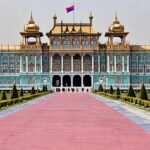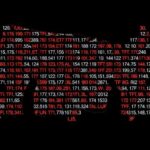Dispute Over Nigerian Presidential Jets Seized in France Amid Tensions with Chinese Firm
In recent developments in international relations, a longstanding dispute between the Nigerian government and a Chinese company has come to light. The most recent chapter in this ongoing conflict involves the seizure of three Nigerian presidential jets by a French court.
The dispute originates from a 2007 contract between Zhongshan Fucheng Industrial Investment and Nigeria’s Ogun State to establish a free-trade zone in the country’s southwestern region. The agreement was terminated between 2015 and 2016, with Zhongshan claiming that it was forced out of the deal through what they described as a “campaign of illegal acts”.
In response, the Nigerian government has condemned the seizure of its planes and accused Zhongshan of attempting to “undercut and scam” an African government. The incident has brought to light a wider campaign by the Chinese company to seize Nigerian assets overseas.
This dispute has not been confined to France alone, as efforts to confiscate Nigerian assets abroad have also been underway in the UK and the US. Despite Nigeria’s defense of “sovereign immunity”, the United States Court of Appeals recently ruled in Zhongshan’s favor, allowing them to proceed with their confiscation efforts.
In defense of their actions, the Nigerian authorities have highlighted that when the Ogun State contract was terminated, Zhongshan had done little more than erect a perimeter fence on the land designated for the free-trade zone. An area like this is intended to attract investors by allowing the movement of goods in and out of a country with reduced or no taxes or fees.
Looking beyond the current dispute, it’s important to note that free-trade zones have been successfully established in other parts of Nigeria, such as Lagos, where major infrastructure projects – including the Dangote Petroleum Refinery – have been undertaken.
Amid the escalating tensions, both the Nigerian government and Ogun State have issued statements, assuring their people that they are committed to protecting the nation’s assets from what they describe as “predators and shylocks who masquerade as investors”.
As this dispute continues to unfold, it serves as a reminder of the complex dynamics that underpin international business relations and the measures that countries must take to safeguard their interests on the global stage.








Post Comment